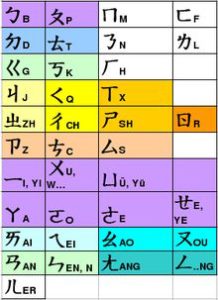The BBC has reported that Zhou Youguang, the man who brought literacy to millions in China after the communist victory in 1949, died on Saturday 14thJanuary, a day after celebrating his 111th birthday.
 After working as a Wall Street banker, Zhou decided, in 1949, to return to China to help with rebuilding the country. In 1955, he abandoned a professorship in economics and began studying writing systems. It took three years to create Pinyin – literally ‘spelled sounds’ (拼音) – a writing system for Chinese based on the Roman alphabet, and his achievement of developing a romanised Mandarin Chinese script brought literacy to millions. It has been estimated that prior to the victory of the communists in 1949, as many as 85% of the population were illiterate.
After working as a Wall Street banker, Zhou decided, in 1949, to return to China to help with rebuilding the country. In 1955, he abandoned a professorship in economics and began studying writing systems. It took three years to create Pinyin – literally ‘spelled sounds’ (拼音) – a writing system for Chinese based on the Roman alphabet, and his achievement of developing a romanised Mandarin Chinese script brought literacy to millions. It has been estimated that prior to the victory of the communists in 1949, as many as 85% of the population were illiterate.Many people believe that the traditional Chinese script is not based on sounds. In actual fact, it is! The correct description for the Chinese writing system is ‘morphosyllabic’ but, because of the large number of sinograms (Chinese characters) needed to represent the words in Chinese, it is very hard to learn – hence the invention of Pinyin.
One of the most recent estimates of the number of single graphs lists about 60,000 sinograms (Mair, V.H., ‘Modern Chinese Writing’ in Daniels, P.T. and Bright, W., (1996), The World’s Writing systems, p.200). Sixty thousand sinograms sounds like far too much for anyone to remember but, according to studies done in the late twentieth century, a mere (!)1000 sinograms cover 90% of all occurrences in texts and 2,400 sinograms cover 99%. This is about the upper limit of human memory: as Victor Mair explains, ‘It would appear that there is a natural upper limit to the number of unique forms that can be tolerated in a functioning script. For most individuals, this amount seems to lie within the upper range of approximately 2,000 to 2,500’. The problem is that even 2,400 sinograms is extremely hard to learn and takes years to achieve, which is why Mao’s government thought it worthwhile to invest in promoting Pinyin.
The difficulties of learning the traditional Chinese writing script give us a keen insight into why Whole Language approaches don’t work. Just as it is extremely hard to learn 2,400 sinograms, it is impossible to remember all the words in the English language as if they were logographs: a bit like trying to remember all the words in the Oxford dictionary. This is why teaching children to read using phonics is the only way to teach all children to read and spell effectively.
There are some fears that the conservatism of the traditional Chinese writing system will hold back the development of the country because of the pressures brought to bear on the use of sinograms by the advances in technology and information. The problem with such a system is that new sinograms need to be invented and added when new morphemes arise in the Chinese language or enter the language through borrowings. This makes the system open-ended and even harder to learn. Imagine learning a new character for every new invented word in a language! With Pinyin or English, for that matter, it’s easy: all words are comprised of sounds and all we have to do is to assign already existing spellings to those sounds and, bingo, we have a new words.
After the killings in Tiananmen Square in 1989, as you can see from an interview he did with the US npr (National Public Radio) in 2011, Zhou became a fierce critic of the Chinese regime and a strong advocate of democracy. One of his last wishes was that he would live long enough to see democracy emerge in modern-day China. Amazingly, after his hundredth birthday he published no fewer than ten books, many of which are banned by the Chinese authorities, and he was an enthusiastic blogger right up to the time of his death.